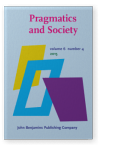Manipulation by deliberate failure of communication
This work studies manipulative use of language that can be called “deliberate failure of communication”; I characterize this kind of manipulation and show that it can be found in the discourse of marketing experts and legal professionals. Relying on relevance theory, I show that manipulation of this kind takes advantage of what van Dijk calls the “context model” of the addressees. I exemplify two ways in which the context models of some of the discourse’s participants might be misused in order to manipulate them. One way is exemplified by a text from an advertisement, the other by a text from a criminal court file. I propose, finally, that the analysis supports van Dijk’s view that social, discursive, and epistemic inequalities reproduce one another in a kind of vicious circle. It suggests, in van Dijk’s terms, that manipulation by deliberate failure of communication is a discriminatory use of language employed by elite groups in order to reproduce their social power.
References
Azuelos-Atias, Sol
2010 “
Semantically Cued Unspoken Assumptions in the Legal Text”.
Journal of Pragmatics421: 728–743.


Azuelos-Atias, Sol
2011 “
On the Incoherence of the Legal Language to the General Public”.
International Journal for the Semiotics of Law241: 41–59.


Burke, Kenneth
1969 A Rhetoric of Motives. Berkeley: University of California Press.

Copi, Irving
1973 Symbolic Logic. New York: Macmillan Publishing.

Greenfield, Aryeh
2001 Penal Law 5737–1977. Verbatim English translation incorporating all amendments up to and including amendment No. 63. Israel: A.G. Publication.

Levinson, Stephen C
2000 Presumptive Meanings: The Theory of Generalized Conversational Implicature. Cambridge, Mass.: The MIT Press.


Russell, Bertrand
1948 Human Knowledge: Its Scope and Limits. London: George Allen and Unwin.

Sperber, Dan, and Deirdre Wilson.
1986 Relevance: Communication and Cognition.
Cambridge, Mass.: Harvard University Press.

van Dijk, Teun A
1993 “
Principles of Critical Discourse Analysis”.
Discourse and Society4 (2): 249–283.


van Dijk, Teun A
2001 “
Discourse, Ideology and Context”.
Folia Linguistica30 (1–2): 11–40.

van Dijk, Teun A
2004 “
From Text Grammar to Critical Discourse Analysis: A Brief Academic Autobiography”. Available at:
[URL]
van Dijk, Teun A
2006 “
Discourse and Manipulation”.
Discourse and Society17 (2): 359–383.


van Dijk, Teun A
2008 Discourse and Context: A Sociocognitive Approach. Cambridge:
Cambridge University Press.


van Dijk, Teun A
2012 “
Knowledge, Discourse and Domination”. In
Pragmaticizing Understanding: Studies for Jef Verschueren, ed. by
Michael Meeuwis and
Jan-Ola Östman, 151–196. Amsterdam: John Benjamins.


Wodak, Ruth
1996 Disorders of Discourse. London: Longman.

Wilson, Deirdre, and Dan Sperber
2004 “
Relevance Theory”. In
Handbook of Pragmatics, ed. by
Larry Horn and
Greg Ward, 607–632. Oxford: Blackwell.

Cited by
Cited by 2 other publications
Azuelos-Atias, Sol
2016.
Identifying the meanings hidden in legal texts: The three conditions of relevance theory and their sufficiency.
Semiotica 2016:209
► pp. 99 ff.

Azuelos-Atias, Sol & Ning Ye
2017.
On drafting, interpreting, and translating legal texts across languages and cultures
.
International Journal of Legal Discourse 2:1
► pp. 1 ff.

This list is based on CrossRef data as of 13 april 2024. Please note that it may not be complete. Sources presented here have been supplied by the respective publishers.
Any errors therein should be reported to them.
